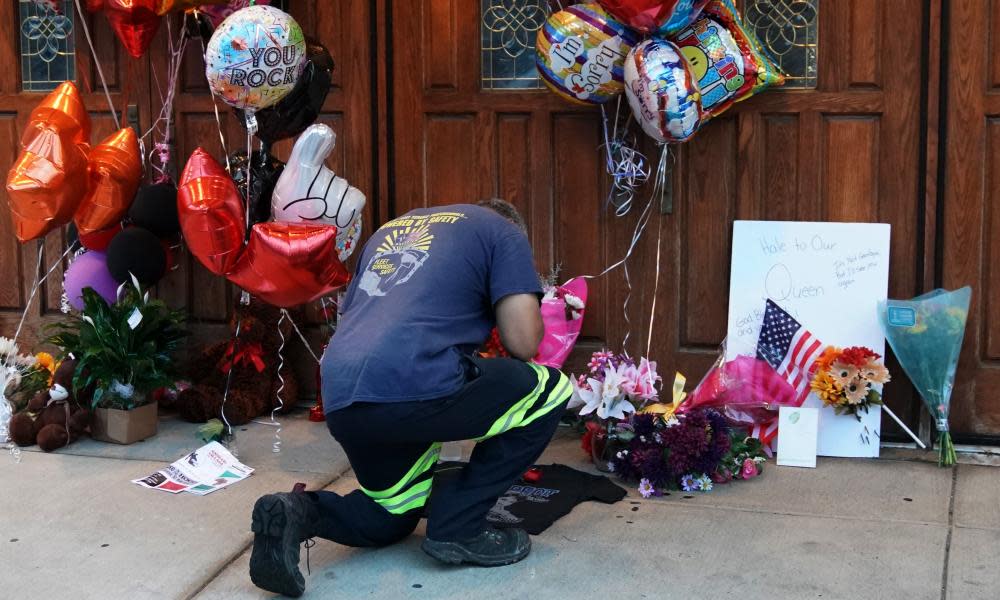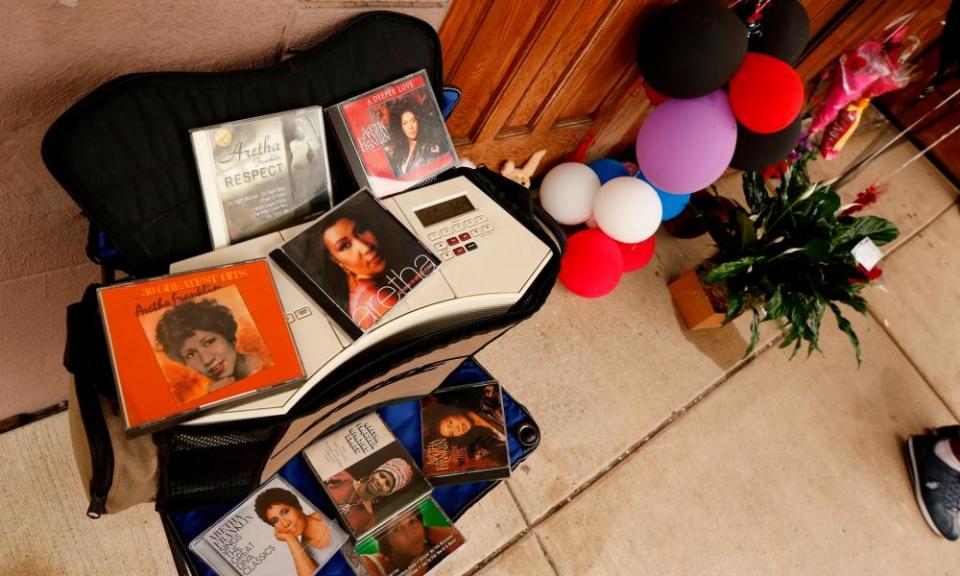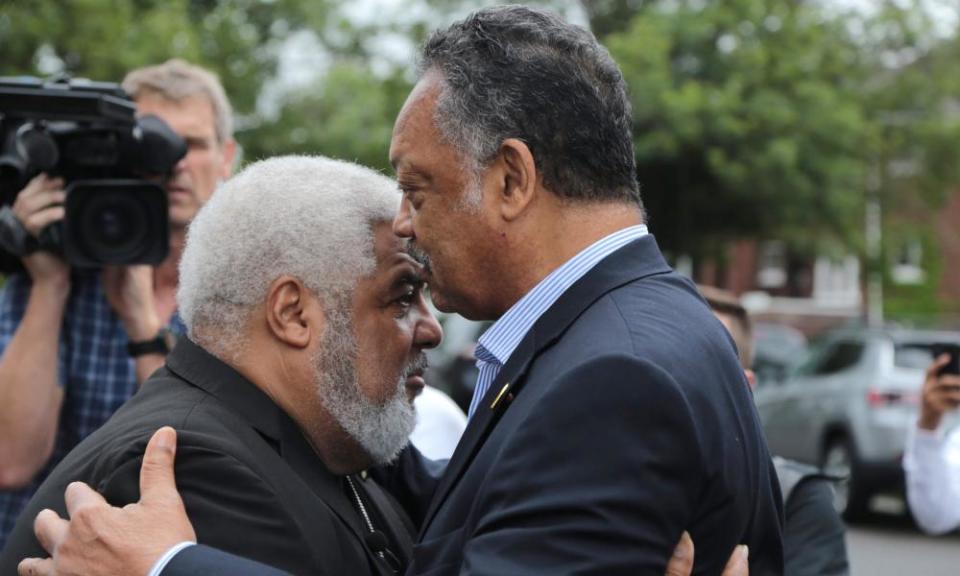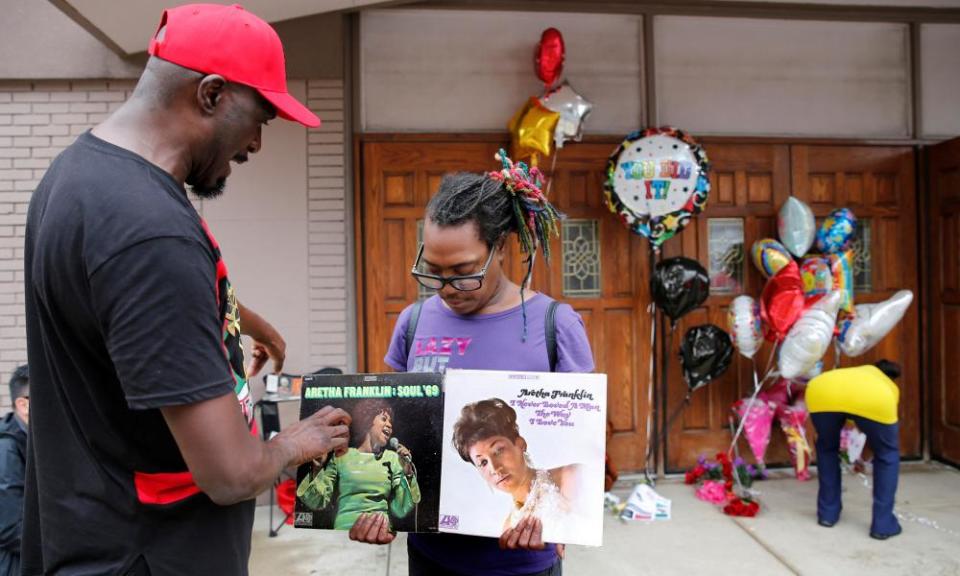'A legend from our house': Detroit mourns Aretha Franklin

The ominous clouds that rose over Detroit on Thursday brought more than just an unexpected bout of summer rain. They reflected the feelings of a city that was mourning the loss of one of their own.
Aretha Franklin, who died at 76 of advanced pancreatic cancer, has left a legacy of song, spirit and strength that Detroiters paid tribute to in both celebration and sorrow.
The New Bethel Baptist church in the city’s North End neighborhood was buzzing with fans, friends, local news vans and members of the congregation who gathered to pay their respects after hearing of her death that morning.
A lifelong fan, Terry Tarrant set up his boombox, CDs and a folding chair at New Bethel’s entrance, and played some of Franklin’s most memorable, as well as her lesser known, songs.
“Aretha Franklin is a pure, mega gift of talent, an iconic superstar who never left Detroit – and that’s why I adore her,” Tarrant said, as her 1994 hit A Deeper Love blared in the background.

To the world, she was the undisputed “queen of soul”, but for many black Detroiters, including Tarrant, she was also “Ree-Ree”, a beacon of the community who empowered them with her music, always gave back and never forgot the city she grew up in – or its people – no matter how far she ventured.
“Even when Detroit was up in flames, she sang about respect – not just respecting yourself, but respecting your city,” Tarrant said, referring to Franklin’s 1967 hit Respect, which became a feminist and civil rights anthem and was released the same year that the devastating Detroit Riots took place.
New Bethel grew immensely under the direction of her father, the late Rev CL Franklin, who preached there from 1946 to his retirement in 1979. It’s also where Franklin herself grew up, a place that propelled both her spirituality and singing career.
As a young child, she began singing at the church and subsequently traveled across the country with her father, who was also a popular recording artist dubbed the “man with the million-dollar voice”. But her talent soon outgrew the pulpit.
It was Joe Von Battle, a pioneering record store owner in Detroit and one of the first independent black record producers in the world, who became the first person to record her voice on Never Grow Old when she was 14 years old. JVB also released her first album, Songs of Faith, in 1956.

Robert Tyson, an on-and-off member of the New Bethel congregation who said he has known Franklin and her family for several decades, came to the church to commemorate Franklin’s career and support of the community. “I call it the celebration of life, because you’re going home,” he said. “Physically you’re gone, but the music never dies.”
Along with the music, the church and the Franklin family’s essential role at the center of the burgeoning civil rights movement and how it flourished in Detroit will not be forgotten by its residents.
It was CL Franklin who led a march called the Detroit Walk to Freedom down Woodward Avenue in 1963 with Dr Martin Luther King Jr. With more than 125,000 people in attendance, it was the largest civil rights demonstration of its time and became the prototype for King’s March on Washington later that year.
Close by to where the Detroit Walk to Freedom took place, Montez Miller wrapped heart-shaped balloons that said “I love you” and a white teddy bear to a pole at the corner of Madison and Brush streets. Miller was hired several years ago to work as a photographer for Franklin.
“I’ve been in a lot of pain ever since Sunday,” when Franklin was reported to be gravely ill, she said. “And when the news came to today that it was real all I could do was just start crying because I am truly grateful for the ‘queen of soul’ and everybody can’t say that,” she told reporters at the intersection. “I thank God for her.”
It was an apt place to mark her legacy, as a section of Madison Street was honorarily renamed Aretha Franklin Way on 8 June 2017, much to Franklin’s delight.
Standing in front of a crowd that day at Detroit’s Music Hall Center for the Performing Arts just across the street, Franklin spoke about performing at local venues early in her career, like the legendary Flame Show bar and 20 Grand, a famous nightclub where the Supremes and Stevie Wonder once sang.
“Detroit has been with me ever since then, they were there when no one else knew who I was, and I have been with them every step of the way,” she said.

Just a couple of blocks down, Elsie Swann had been playing Aretha Franklin records for days at Dilla’s Delights, a doughnut shop opened in honor of another Detroit music legend, J Dilla.
“Detroit is legendary in that music is not the same without it, and Aretha Franklin is part of that legacy,” she said. “She was one of the reasons why no matter what, people gravitated to this place.”
Swann also spoke of the symbiotic relationship Franklin had with the city – she uplifted and claimed it when many other didn’t. In return the city’s residents claimed her. With both grit and talent, she was Detroit, personified.
“This is a legend from the crib, from our house,” Swann said.
Brad Hales, a Detroit DJ and founder of People’s Records, a beloved spot for record hunters who come from all over the world to get rare finds, had been fielding calls all day from Aretha aficionados looking for her music.
“She changed the course of the last century,” he said between requests, adding that her records had the distinct ability to make anyone cry. “It’s one of the things Detroiters can feel proud about, it makes us feel good,” he said.
Across town, crowds had gathered through the day at the Motown Museum to sign a guestbook and leave flowers for Franklin.
During a break in the rain, Javanna Jones, a lifelong fan, stopped by the museum to take photos and sign the guestbook, she said, because she felt like she had to put her name on something when she heard the news.
“Losing her today was like losing a family member,” she said.

Franklin never recorded an album with Motown, but was nevertheless associated with Berry Gordy’s Motown sound. Nevertheless, the museum pledged to play her music all weekend long.
As the outdoor speakers played hits like Do Right Woman, Do Right Man and Think, Carleton Gholz, founder and CEO of the Detroit Sound Conservancy, had a bouquet of pink roses – reported to have been one of Franklin’s favorite flowers – sent to United Sound Systems, the place where Franklin recorded while she was signed to Arista Records in the 1980s. Threatened by the proposed widening of the nearby I-94 freeway in recent years, the historic studio was put up for sale for $1.5 million in June.
“We will still be grappling with her recorded legacy until the end of our species,” Gholz said. “We honor her today but we have more to do. She reminds us that when we get away from the arts, music and expression and we don’t give those opportunities to people, we are in trouble.”
Back at New Bethel, some jumped across large overflowing puddles to reach the door and pay their respects.
“If God didn’t have someone to lead his choir, he does now,” Tarrant said.

 Yahoo News
Yahoo News 
